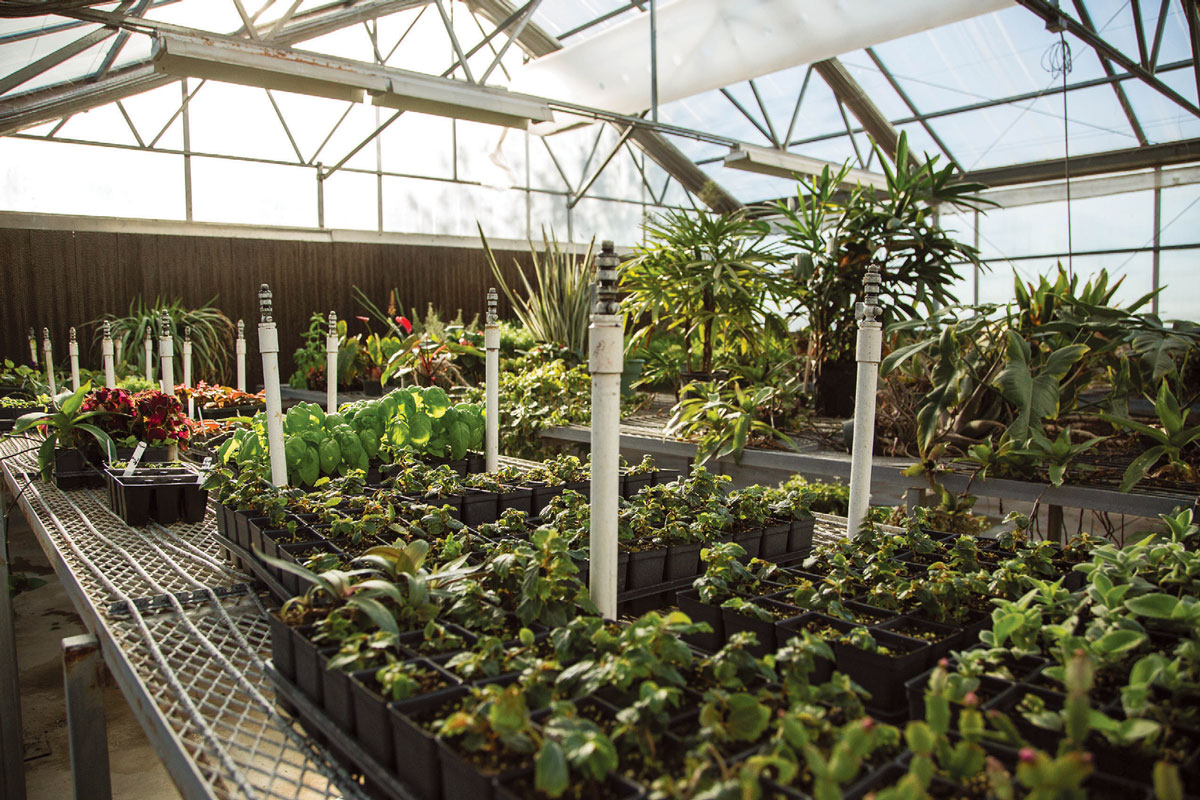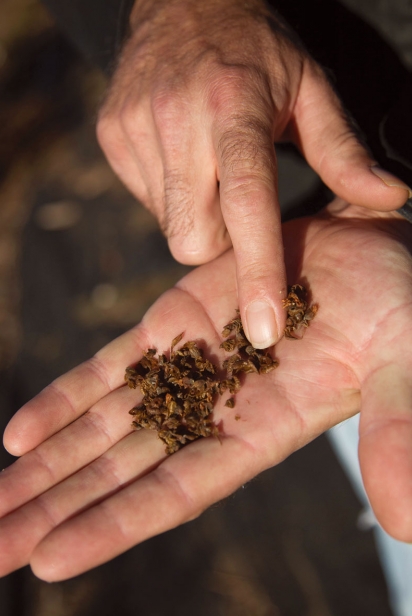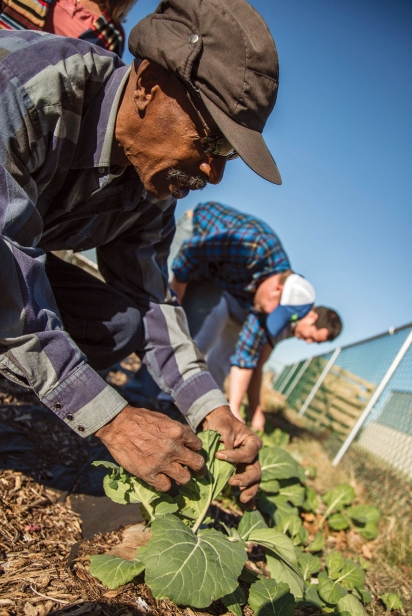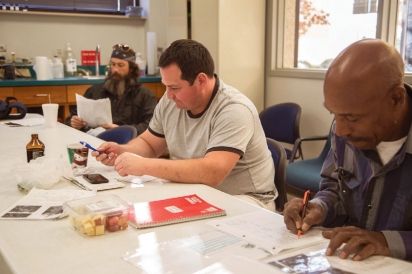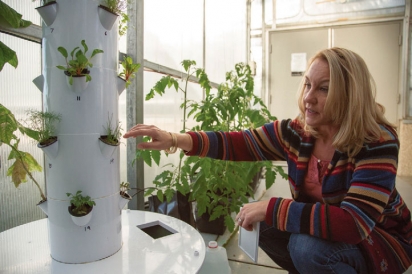Growing Gardeners
TCC horticulture program takes root, bears fruit
It’s all hands on deck at Green Country Horticulture Center—all hands in dirt, if you want to be literal.
The author Voltaire famously ended his story Candide with the proclamation that in life, before all else, “we must cultivate our garden.” It’s a beautiful phrase, insisting gently that before we chase our dreams and set out to change the world, we must first tend to our own backyard.
In the case of Tulsa Community College’s (TCC) horticulture program, based at the corner of the Northeast Campus, the sentiment seems particularly relevant. Honest work and iron will are breathing new life into it, in the midst of a focused revamp that began in August 2015. Under visionary new leadership, the small department has big ideas, and its members are hard at work to make them real—in a rather literal way, starting from the ground up.
Now, as in the past, the horticulture program at TCC operates in a threadbare way, with six staff members, led by coordinator Cherlyn Reeves. Reeves, who studied at TCC, then Stillwater’s Oklahoma State University before returning to Tulsa to work as an adjunct in 2012, only began work as the program’s director in August 2015. She did not assume the mantle timidly—within weeks they were well into a plan to rehabilitate the embattled program, based on a master plan she had created one year prior.
Reeves’ plans are based on lifelong accumulation of experience in the field. “I remember being a child and playing in the garden with my grandmother—two different grandmothers,” says Reeves of the roots of her passion. “One had a strawberry patch, one just did the flowers, and I was constantly in that world, all the time.” She has been known to self-describe with modesty: “I draw, and color, and play in the dirt.”
This orbit of interests led to her eventually making a name for herself in the field of playground design, though she found her focus narrowing with time. She started paying more attention to the architecture of landscapes, and the ways people can control the processes that shape the world. Horticulture plays hand-in-hand with landscaping endeavors such as these.
“You’ve got to know the plants and trees you’re putting in around somebody’s house,” Reeves says. “You’ve got to know how they’re going to react, if they’re the right ones or not.”
Horticulture as a field is much more nebulous and expansive than its Latin roots convey—hortus cultura, “garden cultivation.” Where agriculture is large-scale, often single-crop production, and botany is the scientific study of plant life—phenotypes and genotypes and such— horticulture operates on a smaller scale, with a wider variety of plants, flowers and trees in play with each particular project. Viticulture, the growing of grapes, is one field of study under horticulture’s umbrella, as is the related field of oenology, focusing on the production of wine. There is postharvest physiology, which studies how plant life works once plucked from sources of nutrition, surviving transit on the way to your table, and there is also the study of turf management—the field of study that brings you golf courses and scenes of nature manicured to please the eye and spirit.
According to Reeves, the unassuming program at TCC’s Northeast Campus is the only one of its kind in the state—all the more surprising when you consider the limitations it operates under.
“We have no money,” Cherlyn mentions, more than once, and the administration’s views on her expansion amount, she says, to “‘Do what you gotta do with what you have,’ pretty much, at this point in time.” Some projects, like an outdoor student lounge adjacent to the building, have only come together through a combination of donations and hard labor. Copious shrubs for the build were provided by the Hardesty family, but the work of planting them fell to the students. The renovations are hands-on. Then there are the efforts of students such as Bryan Hutchinson, an engineering student who purchased two tower gardens for the program to use in aeroponic gardening projects. President of the school’s Horticulture Club, he also has a mind toward entrepreneurial methods of fundraising, talking of selling seed starts— blends of seeds for use in gardening. Anything to finance the program.
Cherlyn understates the speed with which she’s set the department on the path to overhaul. “The structure of the program was already here,” she says. This despite efforts in the past to shut the program down entirely, efforts which failed after written protest. This despite the fact that before her arrival, the program—which has 5 acres on which to operate—had never had a dedicated community garden on its grounds. By October there were a handful of tilled rows in a chainlink rectangle, with garlic, tomatoes, peppers sprouting from its lines. Even a tiny watermelon, holding on for dear life against encroaching winter.
The horticulture building, despite being built decades ago, nonetheless has the atmosphere, that certain warmth, of a home under construction. There is an energy here, a buzzing. One gets the sense that it’s the kind of place that will look different on next visit, as projects coalesce into reality, new initiatives take root, and ideas drawn and diagrammed come into fruition.
The master plan as of fall 2015 included a raised garden, the aforementioned pergola and a par-four single hole for golf. Walking paths link all the aspects, existing for different demonstrative purposes, for hands-on study in the field of horticulture. That these projects are in the hands of students is a matter of design, not a concession to necessity. The sense of ownership, to Reeves, is key. It’s so students of today can return in time to campus with their kids, point out a lake or a labyrinth, smile shrewdly and say “I built that.”
Aside from the physical aspects of building up this program, there are philanthropic concerns central to its goals as well, paralleling the program’s own improvement in importance. TCC’s Northeast Campus sits in an area of Tulsa that is ironically both barren and ideal—one more food desert at the edge of town. The acreage here is open as the sky above. There is a lacuna in the food chain here that Reeves intends to help bridge.
Already, the Northeast Campus plays host each month to Tulsa’s Food on the Move program, a roving market event for the public with a pay-as-you-go pricing model, aimed to deliver fresh produce and staging areas for community health services to the spaces in our city that have otherwise been left bereft. And on January 8–9, the campus will host the Horticulture Industry Show, a two-day workshop to teach applicants how to create their own edible landscapes, learn the best way to compost or otherwise how to coax a seed of any sort into a thriving installation on their own lawns, kind to the eye and good for the body.
In addition to a large national Future Farmers of America contest that last year drew in excess of 400 students, the campus will host EcoFest on March 26, a vibrant festival of cooking lessons, lectures and films, with concurrent activities for kids, like camel rides and horse-drawn wagons. And then, as it does every April, it will host a great plant sale for the public.
Currently, TCC Northeast Campus offers three degree options under the umbrella of horticulture: general horticulture, turf management and landscape management. And beyond the student body, Reeves has ideas to create certificate programs, two-day affairs—crash courses, if you will—for learning aeroponics, aquaponics—cyclical methods of small-scale plant production that can be maintained at home, through the use of consumer-level tower gardens, or bathtubs full of koi, respectively.
“If there’s a need in the community that needs to be addressed, or taken care of, horticulture-wise, we’d love to hear from people,” Reeves says. “We’ve noticed that these young students, literally don’t know where the food comes from—they think it comes from Reasor’s. So we’re trying to teach them how to grow it—but then they don’t know how to cook it—they don’t know what to do with what they grew. So we’d like to start implementing some cooking classes to teach them how to cook it. And then what to do after, they don’t know how to can, or preserve, or freeze.”
The whole process is important, so Reeves wants to skimp on none of it. She dreams of a dedicated farmers’ market on campus, but her goals go far beyond the marketplace, or sales of any kind of plant, into “the whole full cycle of growing it from seed, to harvesting it, how to cook it, preserve it, collect your seeds again and reharvest your seed for next year’s crop. We would like to help anybody out in the community who wants to learn about that. You don’t need to just come for a horticulture degree—you can come here just to learn more.”
The sky’s the limit, the ground is fertile. And according to Cherlyn Reeves, the time is now. “We’re kind of on our own out here. We’ve got to be the ones who make it happen.”
If you would like to donate to or are otherwise interested in the horticulture program at TCC, please visit or write to the Green Country Horticulture Center, located on TCC Northeast’s Campus at 3727 E. Apache St., Tulsa, OK 74115.
Green Country Horticulture Center TCC NE 2016 upcoming events
January 8 and 9: 35th Annual Horticulture Industries Show
March 10: open house
March 26: Ecofest
April 5: student-hosted campus plant sale
April 15: FFA Career Development Event
On the second Tuesday of each month, TCC NE hosts a horticulture club meeting that is open to the public.


